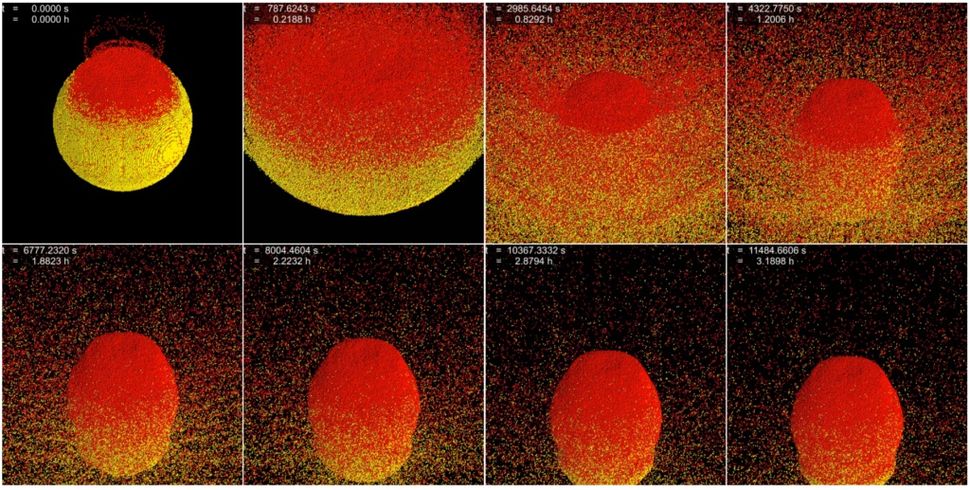Science
Related: About this forumWhy Smashing Asteroids to Save Earth Likely Won't Work
By Meghan Bartels 3 hours ago

Simulation images show how gravity pulls asteroid pieces back together after an impact.(Image: © Charles El Mir/Johns Hopkins University)
If humanity ever truly felt our existence threatened by an asteroid, one potential recourse would be to smash the looming space rock into pieces — but new research suggests that that approach may be less likely to succeed than people hope.
The research suggests that an asteroid wouldn't break apart as drastically as previous models suggested, and that in the aftermath of the attempted destruction, the asteroid's gravity would be strong enough to pull the fragments back together.
"It may sound like science fiction but a great deal of research considers asteroid collisions," lead author Charles El Mir, a recent doctoral graduate at Johns Hopkins University, said in a university statement. "For example, if there's an asteroid coming at Earth, are we better off breaking it into small pieces, or nudging it to go a different direction? And if the latter, how much force should we hit it with to move it away without causing it to break? These are actual questions under consideration."
Answering those questions, unsurprisingly, would be easier if we knew more about asteroids — the authors wrote that even when it comes to asteroids that scientists have density estimates for, they typically aren't sure what their interior structure is. Nevertheless, simulations let them model asteroids with a broad range.
More:
https://www.space.com/asteroids-hard-to-smash-earth-defense.html?utm_source=notification
Hoyt
(54,770 posts)Buzz cook
(2,474 posts)Not destroy them. If we can get to an asteroid before its inside the lunar orbit, a few nukes should push it off on a safe course.
LunaSea
(2,895 posts)Check out the "Gravity tractor"
A concept we ought to be working on right now!
https://www.nasa.gov/content/asteroid-grand-challenge/mitigate/gravity-tractor
Gravity Tractor
If an approaching asteroid were detected early enough, it could be possible to divert its path using the gravity of a spacecraft. Instead of sending an impactor to ram into an approaching object, a gravity tractor device would fly alongside the asteroid for a long period of time (years to decades) and slowly pull it out of Earth’s path. Gravity tractors would be most likely to work on any shape or composition of approaching asteroid, even if it were just a pile of rubble. However, gravity tractors might not be effective for the largest asteroids of over 500 meters in diameter which might be the greatest threat to Earth. Gravity tractors offer the greatest control and could perhaps even divert an approaching asteroid to other locations in space where people could theoretically use them for research or commercial purposes. However, these techniques have never been tried and would require decades for building, launching, and carrying out a mitigation mission.
Javaman
(62,534 posts)qazplm135
(7,447 posts)1. exactly how long to pull back together? I mean if the gap is long enough, then smashing them could very well work.
2. Smashing them should still alter its course yes?
LunaSea
(2,895 posts)Pulling back together depends on a number of things.
Amount of energy imparted to the pieces, and the density
of the rock.
Of course, making a big rock into a bunch of small rocks really just multiplies
your problems in the long run, but a single rock on a predictable course just needs a slight
nudge to keep out of our way.
qazplm135
(7,447 posts)a lot of little impacts is better than one big one.
Better chances for some to burn up in the atmosphere, for others to impact in a way that causes less damage.